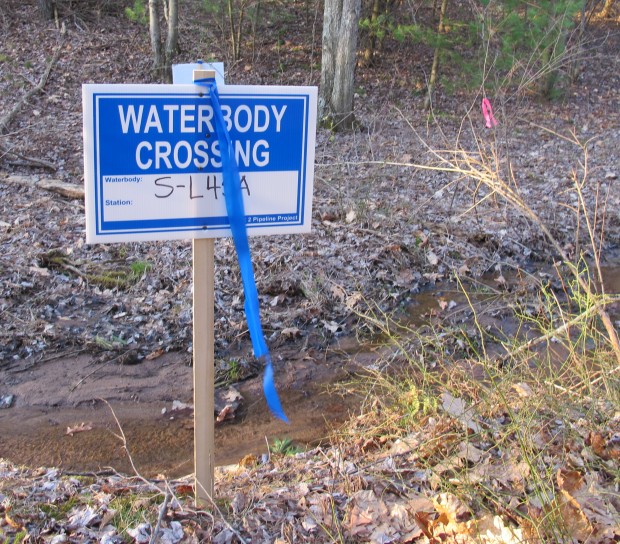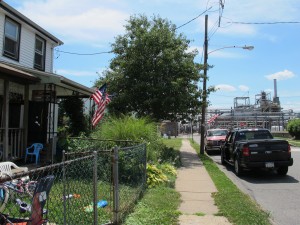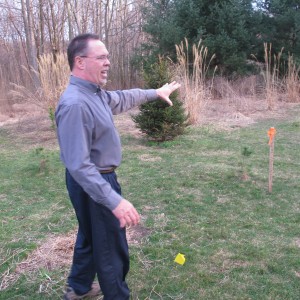Mariner East 2 partisans clash at DEP public meeting in West Chester
-
Jon Hurdle

Susan Phillips / StateImpact Pennsylvania
A sign marks a water crossing on land in Huntingdon County where Sunoco wants to build the Mariner East 2 pipeline. Although Sunoco still has to acquire water crossing and earth moving permits from the DEP, the company has already cleared the area of trees.
Friends and foes of Sunoco’s Mariner East 2 plan to build two natural gas liquids pipelines across southern Pennsylvania lined up to support or attack the plan in equal measures at a public meeting called by the Department of Environmental Protection in West Chester on Wednesday evening.
Arguments on both sides strayed well beyond the technical agenda of the meeting – to gather public comment on Sunoco’s applications for two DEP permits on earth disturbance and water quality – and ranged from job creation to public safety to climate change, reflecting the impassioned views on the project held by partisans in both camps.
Virginia Cain, a DEP community relations coordinator who moderated the almost three-hour session at West Chester University, said the 40 speakers were split exactly evenly between supporters and opponents of the project, with 19 on each side and two she recorded as neutral. Each was given a three-minute slot to address the meeting, which drew about 300 people.
As well as residents and local officials, the meeting drew trade unionists who argued that construction of the pipeline will create hundreds of jobs for their members, and will pump NGLs across the state safely, thanks to stronger materials and improved techniques than were used in previous generations of pipelines.
George Morrison, a pipeline welder who belongs to Steamfitters Local 420 in Philadelphia, said his work is subjected to rigorous inspections by officials from the owner or operator of a pipeline. He said public fears about pipeline leaks or explosions are based on a misunderstanding of the construction process.
Morrison said he had not planned to speak at the meeting but put his name on the speakers’ list at the last minute because he felt compelled to make his case for pipeline safety after hearing critics’ concerns.
“I wanted to see people to see this from a workers’ point of view,” he said in an interview outside the auditorium. “The inspection is so tight, it’s so critical.”
Morrison, 54, who has welded pipelines for 35 years, said that welders are subjected first to drug tests, and then have to perform several test welds before an inspector, who will also look at equipment, and then cut into a sample weld to look for any faults.
Completed welds are visually inspected and x-rayed, and then hydrostatically tested, he said.
There is little tolerance for faulty work, Morrison said. “If three of my welds are rejected, I’m out of a job.”

Susan Phillips / StateImpact Pennsylvania
A street in the borough of Marcus Hook, Delaware County with the Sunoco refinery in the background. Mariner East supporters say the new pipeline will help keep jobs in the area.
Successful welds are stronger than the pipe, while modern pipe is much stronger than that of previous generations, he said. He argued that critics should instead focus on the economic benefits of the Mariner East 2 project.
“I’m in favor of it because it would bring work to the area, bring jobs, bring food to my table,” he said.
But Nora Nash, a Catholic nun who belongs to the Sisters of St. Francis of Philadelphia, said the $2.5 billion pipeline would threaten public health and undermine national efforts to comply with the COP21 Paris agreement to cut greenhouse gas emissions.
Nash called the 350-mile pipeline project “a commercialization of our regional environment that has little to do with energy independence and more to do with corporate power and money.”
She accused the DEP of doing a poor job of regulating the natural gas industry in the shale gas boom of the last decade, and said the department is more inclined to protect the industry than the public.
“What is very disheartening is that we know the regulations are often written and overseen by persons and interest groups who protect the industry and not the citizens of the state,” she said.
The DEP also came under fire from Chester County state Senator Andrew Dinniman, a Democrat, who said the public-hearing process was a sham because the department had already made its decision on Sunoco’s permit applications.
“You have already made up your mind, and you know it, the citizens know it,” Dinniman told Cain and another DEP official on the stage. He called for an extension of the public-comment period beyond the current Aug. 24 deadline.
Still, Dinniman said he was “not opposed” to the project because of its economic benefits.
Cain said officials would not immediately respond to public comments at the meeting – the third in a series of four on the permit applications — but would do so in writing at the end of the comment period.

Susan Phillips / StateImpact Pennsylvania
Jerry Thomas of Lebanon County has been fighting Sunoco in court over eminent domain. The Mariner East 2 will run through his front yard.
Pamela Bishop, a resident of West Cornwall Township in Lebanon County, accused the DEP of failing to reject Sunoco’s applications for a Chapter 105 water-quality permit despite several of the applications being incomplete.
“Rather than issuing permit denials, DEP allowed Sunoco to revise and resubmit applications multiple times,” Bishop told the meeting. She argued that the DEP should extend the public-comment period by at least 30 days in light of the extensions given to Sunoco.
She rejected claims that pipeline critics are opposed to job creation but said public health must be protected.
“We who oppose this pipeline are not against jobs or progress,” she said. “We are for what the Pennsylvania laws and constitution require: protection of health and safety for all Pennsylvanians and protection of our environment.”
But the pipeline’s projected economic benefits were hailed by Bruce Dorbian, Director of Planning and Development for the Borough of Marcus Hook, where a shuttered refinery is being repurposed as a terminal for storing, processing and shipping the NGLs that would be pumped in by the pipeline.
He said the new terminal will regenerate local jobs that were lost in the refinery closure, and will help the economy of southeastern Pennsylvania build a petrochemical industry as part of the proposed “energy hub”.
“Pipelines are a safe way of transporting natural gas and natural gas liquids,” Dorbian said.
Jeff Shields, a spokesman for Sunoco Logistics, said the company is “committed to developing the Mariner East system in an environmentally responsible manner” and that it recognizes the DEP hearings as an “integral part” of the permit process.
Mariner East 2 faces legal challenges from some landowners who are fighting the company’s use of eminent domain to build the pipeline on their land, and from the environmental group Clean Air Council which argues that the project does not have the required state permits because it is not legitimately an intrastate pipeline.
















